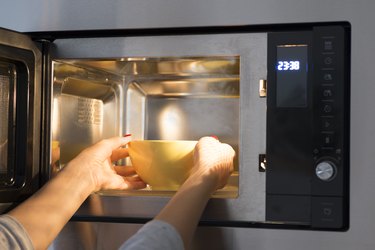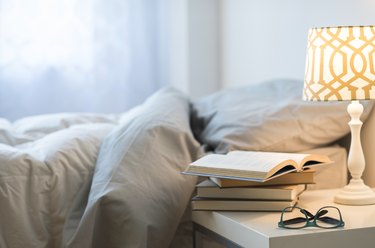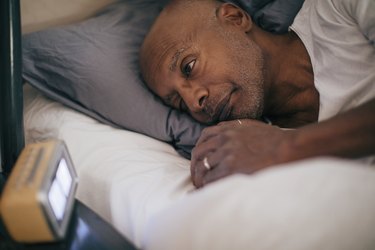
Cookies or chips might hit the spot while you're watching TV before bed. But if you're looking for a snack that might actually help you nod off, look to the humble soybean.
Turns out edamame, the soybean pods that can be eaten steamed in their shell (with a sprinkle of salt, please), are loaded with a sleep-spurring nutrient that could make it easier to drift off to dreamland.
Video of the Day
Video of the Day
Why Edamame Is One of the Best Bedtime Snacks for Sleep
Edamame is rich in tryptophan, an amino acid that's involved in healthy sleep patterns. The body uses tryptophan to produce melatonin, the hormone that helps regulate your sleep-wake cycle, according to the National Library of Medicine.
"So, eating tryptophan may result in a surge, a little later, in melatonin," says Michael Grandner, PhD, CBSM, director of the Sleep and Health Research Program at the University of Arizona.
That might help you doze off a little easier. Your body normally starts pumping out melatonin as it gets dark out, which signals that it's time to start preparing for sleep, notes the National Center for Complementary and Integrative Health (NCCIH).
In fact, people who eat fruits, vegetables and legumes with high tryptophan levels are more likely to report better sleep than those who consume foods with lower tryptophan levels, concluded an August 2021 Annual Review of Nutrition analysis.
Edamame isn't the only source of tryptophan, but it's one of the best. A cup of the pods serves up 416 mg of tryptophan, or around 150 percent of the daily recommended amount, per the USDA. (Poultry, beef and salmon do have a little more tryptophan. But do you really want to snack on a fillet before bed?)
Tips for Eating Edamame Before Bed
So how much edamame do you need to nosh on at night, and when's the best time to eat it?
The answer is: We aren't sure.
Experts understand the basic relationship between tryptophan, melatonin and sleep. But it's hard to say for sure exactly how much tryptophan someone needs to consume to reap the benefits, or exactly when they should eat it in relation to bedtime.
"It's not known how fast tryptophan is converted to serotonin then melatonin. It's likely that consumption in the evening might be beneficial, since you are giving your body the raw materials to naturally produce melatonin," Dr. Grandner explains.
That said, it is clear that eating too much food in general in the evening or eating too close to bedtime can disrupt your sleep (especially if you have acid reflux).
So consider sticking with a moderate amount of edamame — think 1/2 to 1 cup. Try to have your snack at least three hours before bedtime, too, to allow your stomach plenty of time for digestion, recommends the Cleveland Clinic.
Finally? Don't expect miracles. Tryptophan can help support healthier sleep, but it's not a substitute for healthy sleep habits, especially if you have a sleep disorder.
"It does not seem to have a very strong effect for people with sleep problems, so it may have stronger effects in people with normal sleep patterns," Dr. Grandner says.
Other Tips for Getting Better Sleep
A cup of edamame is a smart snack to reach for before bed if you get hungry. But you'll get the biggest benefit from any sleep-promoting food when you pair it with healthy sleep habits. Be sure to:
- Get some light exposure in the a.m. Morning light plays a key role in regulating your sleep-wake cycle because it stops melatonin production in the a.m. and helps it ramp back up in the evening, per the Centers for Disease Control and Prevention (CDC).
- Exercise every day. Try to get at least 30 minutes of movement most days of the week. People who are active tend to sleep better than those who are sedentary, according to the Mayo Clinic.
- Manage your stress. Unchecked stress can make it harder to fall asleep. Pick a calming activity you enjoy and try to stick with it, the Mayo Clinic notes. A few minutes of meditation or breathing exercises, anyone?
- Wind down before bed. A quiet bedtime routine can help your mind and body relax and set the stage for sleep. Activities like journaling, reading, yoga, taking a bath or listening to calming music all work. Just try to stay off your phone or tablet, because the blue light and fast-paced content can rev you up.
- Keep a regular wake-up time and bedtime. Getting up and going to bed at the same time each day will also help sync your body's internal clock, so you start to feel sleepy when your head hits the pillow, says the Mayo Clinic.
- Keep your room dark, cool and quiet. Block out any light, turn down the thermostat and run a white noise machine to dampen any outside noise.
- National Library of Medicine: "Tryptophan"
- National Center for Complementary and Integrative Health: "Melatonin: What You Need To Know"
- Annual Review of Nutrition: "Sleep and Diet: Mounting Evidence of a Cyclical Relationship"
- USDA Food Data Central: "Soybeans, mature cooked, boiled, without salt"
- Cleveland Clinic: "Is Eating Before Bed Bad For You?"
- Centers for Disease Control and Prevention: "Effects of Light on Circadian Rhythms"
Is this an emergency? If you are experiencing serious medical symptoms, please see the National Library of Medicine’s list of signs you need emergency medical attention or call 911.


